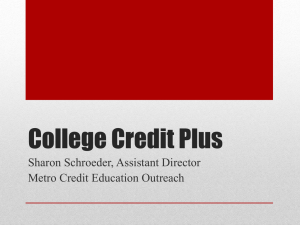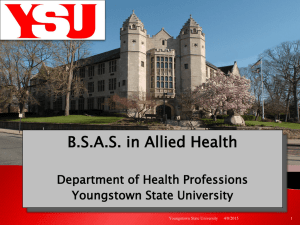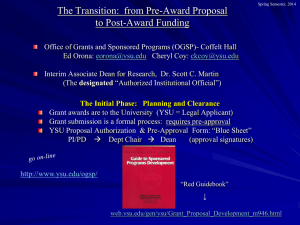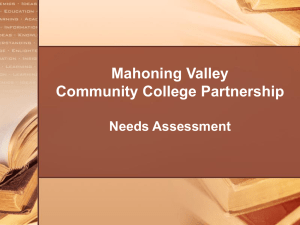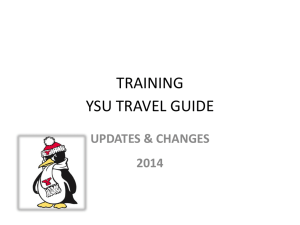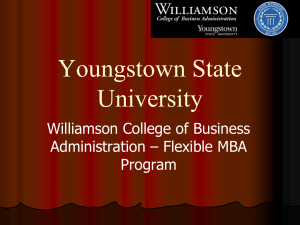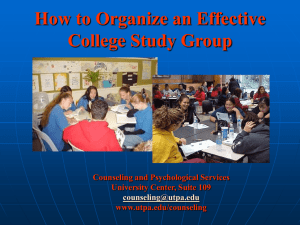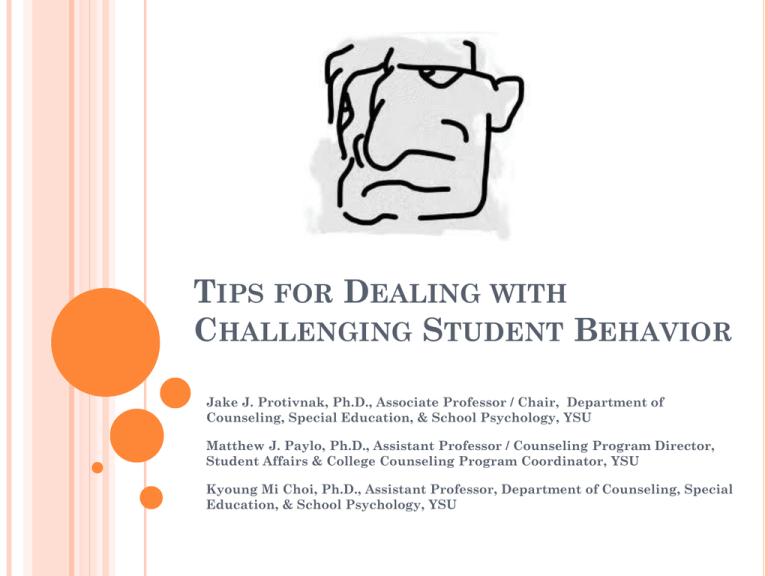
TIPS FOR DEALING WITH
CHALLENGING STUDENT BEHAVIOR
Jake J. Protivnak, Ph.D., Associate Professor / Chair, Department of
Counseling, Special Education, & School Psychology, YSU
Matthew J. Paylo, Ph.D., Assistant Professor / Counseling Program Director,
Student Affairs & College Counseling Program Coordinator, YSU
Kyoung Mi Choi, Ph.D., Assistant Professor, Department of Counseling, Special
Education, & School Psychology, YSU
DISCUSSION OVERVIEW
Discuss examples presented by attendees.
Provide suggestions regarding behaviors that
could be grouped into either:
Personal/Social (e.g., class disruptive, passiveaggressive, mental health related-issues, etc.) issues
that instructors may need to address.
Academic (e.g., frustration associated with lack
knowledge/skills/support needed for course, etc.) or
Examples…
Wingert & Molitor, 2009
DESCRIBING THE PROBLEM CLEARLY
What is the behavior?
When does it happen?
What is going on before, during, and after the
behavior?
Who is involved?
Is the behavior harmful to the student, you,
others?
How do you feel about the behavior?
What changes would make the behavior or
situation acceptable?
What did you do / did it work?
Kuhlenschmidt & Layne, 1999
UNDERSTANDING REASONS FOR BEHAVIOR
Physical Causes
Emotional Challenges
Medication, Drugs, & Other Substances; Illness;
Fatigue; Discomfort; Vision/hearing problems
Loss/Grief; Immaturity; Attention Seeking;
Misdirected Aggression
Environmental Factors
Loose norms for conduct in classroom; Large class
size; Vague/confusing classroom tasks; Too much
routine or too much confusion
Kuhlenschmidt & Layne, 1999
CHALLENGING PERSONAL/SOCIAL BEHAVIORS
Mental Health Related Issues
Dispositions/Character Issues
(e.g., lack of civility; inappropriate language that demeans or
dehumanizes others; disrespect towards classmates/instructor;
demeanor incongruent with expectations for discipline)
Classroom Disruptive Student “behaviors that impede
learning and teaching in the classroom” (Hara, 2012)
(e.g., Depression, Suicidal Ideation, Self Injurious Behavior,
Alcohol/Drug Use; Lack of Personal Hygiene)
Student talks too much; talks to classmates; texting; distracting
attire; sleeping in class; damage to property; excessive absence /
late; misunderstandings; arguments over ideologies; sarcastic;
etc.
Interpersonal conflicts with instructor, classmates, and/or
group members.
Inappropriate Student Self Disclosures
(e.g., self-disclosure through personal conversation (illegal
behaviors), email, phone call, text; secondhand information rumors from classmates)
RESPONDING TO PERSONAL/SOCIAL
BEHAVIOR
Mental Health Related Issues
Express concern
Speak with the student privately
If uncomfortable – ask a colleague to meet with you
Listen
Focus on the behaviors that concern you
Refer
Follow-up
Consult with a colleague on the situation.
Keep your department chair and/or program coordinator
informed
Become engaged and have concern for the wellbeing of the student
– rather than ignore.
RESOURCES
YSU Counseling Services
YSU Ombudsperson
330-941-7285
YSU Police
330-941-3489
YSU Student Conduct
330-941-3571
YSU Student Health Services
330-941-3515
911 or 330-941-3527
YSU Student Threat Assessment Team
Call to report / consult behavior that is inappropriate, troubling, or threatening.
This group is prepared to assess and respond. Serves as a functional "early warning
system" this group will investigate your concern and attempt the most helpful and
expedient intervention.
330-941-4703; http://web.ysu.edu/stat
Faculty & Staff Help Guide http://web.ysu.edu/gen/ysu_generated_bin/documents/basic_module/fshelpguide.pdf
COUNSELING SERVICES
- LOCATION AND CONTACT INFORMATION
YSU Counseling Services provides professional assessment,
short-term counseling, consultation and referrals to
currently enrolled students.
Students typically come into counseling for: Depression,
Anxiety; Low self-esteem; School and work problems; Loss
and grief issues
Location:
Hours:
Mon. through Fri. 8:00 a.m. – 5:00 p.m.
Phone:
Office of Career and Counseling Services, Jones Hall – Room 1034
(330) 941-3515
Website:
http://web.ysu.edu/gen/ysu/Mental_Health_Counseling_m924.html
OVERALL STRATEGIES
Proactive / Reactive
PROACTIVE STRATEGIES
Clear (and realistic) expectations (syllabus,
assignments, attendance, class behavior, grading)
Create a positive classroom environment
Create a class interesting to your students
Demonstrate that you care; interested in students and
their success;
Content, presentation, tone/energy
Ask for regular feedback from students so that you
can adjust the content/presentation
Ask for regular feedback from faculty / dept. chair
Model the behaviors you want to see in your students.
CREATING A CONSTRUCTIVE CLASSROOM
ENVIRONMENT
Defining Expectations at the Outset
Decrease Anonymity
Make good use of first class
Use course syllabi to reinforce expectations
Let students participate in classroom rules
Learn the students’ names
Learn something about students
Find ways to meet with students
Seek Feedback from Students
Find out how the class is going
Encourage Active Listening/Participation
Writing, group discussion, short quizzes
Sorcinelli, 1994
REACTIVE STRATEGIES
During
Intervene when behavior occurs
Avoid defensiveness
Meet privately with student if appropriate/possible
Focus on the issue – not the person
Remain calm
If severely disruptive - Ask student to leave/dismiss
class/call for help
After/During
Contact appropriate resource
Consult with a colleague on the situation
Keep others informed (i.e., prog. coord.)
Reflect / examine your own behavior
COMMON IN CLASS PROBLEMATIC BEHAVIORS
Sorcinelli (1994) provided suggestions for the
following behaviors
Talking and inattention
Unpreparedness and missed deadlines
Lateness and inattendance
Challenges to authority
CHALLENGING ACADEMIC BEHAVIORS
CHALLENGING ACADEMIC BEHAVIORS
Unprepared for class, assignments, exams.
Angry about grade on an exam
Academic Dishonesty
Unlikely to be successful in the course.
RESOURCES
YSU Center for Student Progress
Starfish
Disability Services
Reading & Study Skills Center
Math Assistance Center
Writing Center
Career Services
RESOURCES
Challenging Academic Behaviors
CENTER FOR STUDENT PROGRESS
What is it?
A free tutoring center for all students struggling in a
variety of classes, such as: accounting, engineering,
biology, history, chemistry, physics, economics,
psychology, etc.
Services Offered:
Regularly scheduled and individual group sessions
Independent study materials
Computer assisted instruction
Review sessions for exams
WHEN TO REFER A STUDENT TO CSP?
If a student is not satisfied with their progress
If a student is not understanding the concepts
If a student needs practice in organizing information
If a student needs reinforcement to improve their
confidence
If a student needs help in developing a good
problem-solving strategy
If a student would like another point of view or
another explanation of the major concepts
If a student would like help in reviewing for exams
CENTER FOR STUDENT PROGRESS
CONTACT INFORMATION
If you need additional assistance, stop at the
Center for Student Progress/Tutorial Services
Monday - 8:00 am - 7:00 pm
Tuesday - Friday 8:00 am - 5:00 pm
http://web.ysu.edu/csp
STARFISH
Starfish is a tool designed to facilitate communication between
instructors, advisors and support services (Center for Student
Progress)
Instructors can use Starfish to:
Respond to university progress surveys,
Maintain a student folder of notes and emails,
Record attendance,
Make referrals by raising a flag or give encouragement for student
success.
Fall 2012: 1,506 intro-level classes using Starfish. The response rate
was 31%. Approximately 800 concerns were raised, and all have been
addressed by the Center for Student Progress.
Starfish Training Manual http://web.ysu.edu/gen/ysu_generated_bin/documents/basic_module/S
tarfish__Instructor_Training_Manual1.pdf
DISABILITY SERVICES – OFFERED BY THE
CENTER FOR STUDENT PROGRESS
What is Disability Services?
Disability Services provides assistance for students, faculty and staff
with disabilities.
How does a student become registered through Disability
Services?
Have a documented physical, psychological, and/or learning
disability
Documentation Requirements
http://web.ysu.edu/gen/ysu/Documentation_Requirements_m1703.html
Key Points:
Unlike high school, It is the student's responsibility to ask for
assistance and learn the services that exist on the campus for that
assistance.
There are not special classes for students with disabilities; students
with disabilities are in classes will all other students.
Course work requirements are the same for all students
CSP DISABILITY SERVICES
Services for students with documented
disabilities may include but are not limited to the
following:
Early registration
Testing and classroom accommodations
Escort Services
Limited loan of adaptive equipment
Books on tape/e-text
Sign language interpreters
Notetakers for students who are blind, hard of
hearing or physically unable to write
CSP DISABILITY SERVICES
Can obtain a liaison with YSU departments and
local agencies
Cushwa Hall Lounge for students with severe
disabilities
Adaptive technology computer work stations,
which contain programs such as Jaws 4.0, Open
Book and Zoom Text, are available on the fourth
floor of the Maag Library at YSU
Computers at the CSP Disability Services also have
the same assistive software on them.
CSP DISABILITY SERVICES
Located at 275 Fifth Avenue
Office Phone: 330-941-1372
Office Hours:
Monday – Friday - 8:00 a.m. - 5:00 p.m.
Appointments scheduled as needed
Director:
Gina McGranahan - glmcgranahan@ysu.edu
http://web.ysu.edu/gen/ysu/Disability_Services_m69
5.html
READING AND STUDY SKILLS CENTER
The Reading and Study Skills (R&SS) Center is an
academic as well as a service-oriented division of the
Counseling Department in the College of Education .
What is the Reading and Study Skills Center used for?
To provide a variety of strategies for improving reading and
studying.
To encourage students to choose study techniques appropriate
to their needs.
To help students understand that building reading and study
skills provides high returns for their investment in study
time.
To help students improve performance in academic classes.
READING AND STUDY SKILLS CENTER
The RSS Center will help students improve:
Reading skills
Test taking skills
Study skills
Organizational skills
Computer assisted instruction
Preparation for standardized exams
YSU students may take advantage of services
through:
Academic classes
Self-referral tutoring--individual tutoring with a trained
Peer Tutor
Workshops presented throughout the semester on a
variety of topics
READING AND STUDY SKILLS CENTER
CONTACT INFORMATION
Located in the Maag Library - Room 154 (lower
level)
Telephone:
E-mail address:
rdgstudyskillsctr@ysu.edu
Coordinator:
330-941-3099
Dr. Karen Becker
http://web.ysu.edu/rdgstudyskills/
MATH ASSISTANCE CENTER
The Mathematics Assistance Center [MAC] is an
academic support service which is integrated
with the Department of Mathematics &
Statistics.
The MAC operates on a walk-in basis; no
appointment is necessary.
Services include providing tutorial assistance to
any student currently enrolled in one or more
mathematics courses served by the MAC (tutorial
assistance is limited to these courses).
The MAC gives assistance to all math classes
from 1500 to 3717
MATH ASSISTANCE CENTER LOCATION
Lincoln Building – Room 408
Email: mathassist@math.ysu.edu
You can e-mail your math questions to this address
and get an answer through e-mail.
Phone: (330) 941-3274
http://web.ysu.edu/gen/stem/Mathematics_Assist
ance_Center_m532.html
THE WRITING CENTER
The Writing Center's mission is to help students
become more independent, confident and successful
writers.
Consultations for individuals or small groups
Assessment of writing strengths and weaknesses
Guidance for essays, lab reports, history papers, résumés
and other writing projects in all disciplines
Help with documentation in APA, MLA, Chicago and other
styles
Preparation advice for writing portions of standardized
tests, including the GRE, GMAT, LSAT, etc.
Instruction in linguistics
Tutoring for ESL students
Sessions for peer reviews
WRITING CENTER
Writing Center consultants can help with more
than just English papers. Students can bring in
writing assignments received from other
disciplines.
History papers
Lab reports
Résumés and cover letters
Linguistics assignments
PowerPoint presentations
Speeches
Microsoft Office programs
Job or graduate school application essays and more
THE WRITING CENTER
LOCATIONS AND HOURS
The Writing Center has three physical locations at:
Maag Library - Lower Level - Room 171 - 330-9413055
Monday–Thursday: 9 a.m.–5 p.m.
Friday: 10:30 a.m.–1:30 p.m.
Sunday: 3 p.m.–6 p.m.
Stambaugh Stadium - Room 1097 - 330-941-1921
Monday: 10 a.m.–noon
Tuesday & Thursday: 12:30 p.m.–2 p.m.
Wednesday: noon–2p.m.
Metro College at Southwoods - 330-941-2465
Mondays & Wednesdays: 5 p.m.–6p.m.
Tuesdays: 5–8 p.m.
THE WRITING CENTER
CONTACT INFORMATION
Appointments, walk-ins and online consultations
are available, and clients are permitted either
two walk-ins or an appointment and a walk-in
per week.
Email:
Phone:
wcenter@ysu.edu
(330) 941-3055
http://web.ysu.edu/writingcenter/
CAREER SERVICES
Career and Counseling Services also helps students
who are seeking assistance in mapping out and
building their future.
Career services gives pointers to students in each
stage of their education so that they can stay on track
and be prepared for the world of work when they
graduate.
Location:
Hours:
Mon. through Fri. 8:00 a.m. – 5:00 p.m.
Phone:
Office of Career and Counseling Services, Jones Hall –
Room 1034
(330) 941-3515
Website:
http://web.ysu.edu/careerservices/
OTHER ISSUES
FERPA – Federal law that governs student
records and privacy.
You can share information with individuals on
campus (resources discussed) who are responsible for
the care/well being of students.
Confidentiality
You should not promise to keep secret if a student
shares that they will harm themselves or others.
When sharing concerns with others consider how it
will support the well-being of the student vs. gossip.
Consider if/when you share information with another
faculty if it will negatively impact how they
view/treat the student in their class.
YSU STUDENT CODE OF CONDUCT
http://ysu.edu/thecode.pdf
Students, as members of the University community, shall have the following
responsibilities which are inherent in the basic rights delineated above:
1. To maintain standards of academic performance as established by their
faculty.
2. To be responsible for acting in such a manner as to ensure other students the
rights declared in Section B. of this article.
3. To be responsible for their actions with respect to, and to follow, all
University regulations and policies.
4. To be responsible for their actions with respect to provisions of local, state,
and federal law.
5. To conduct themselves in a manner which helps to create and maintain a
learning atmosphere in which the rights, dignity, and worth of every individual
in the University community are respected.
6. To have in their possession a valid University Identification Card when on
University premises.
7. To be responsible for adhering to the Drug-Free Environment Policy.
8. To ensure adherence to all University Board of Trustees policies that apply
to students. (pg. 6-7)
YSU STUDENT CODE OF CONDUCT
1. Acts of dishonesty, include, but are not limited to: Academic Dishonesty , Non-Academic
Dishonesty
2. Disruption or obstruction of teaching, research, administration, student conduct proceedings, other
University activities, including its public-service functions on or off campus, or other authorized nonUniversity activities, when the act occurs on University premises.
3. Participation in an on-campus or off-campus demonstration, riot, or activity which disrupts the
normal operations of the University and/or infringes on the rights of other members of the University
community; leading or inciting others to disrupt scheduled and/or normal activities within any
campus building or area.
4. Obstruction of the free flow of pedestrian or vehicular traffic on University premises or at
University sponsored or supervised functions.
5. Failure to comply with directions and/or oral or written instructions which are given by any
University official, student, faculty member, or staff who is acting in an official University capacity
and/or failure to identify oneself to these persons when requested to do so.
6. Failure to meet all financial obligations to the University.
7. Violation of published University policies, rules, or regulations including those available
electronically on the University website.
8. Physical abuse, verbal abuse, threats, intimidation, harassment, stalking, bullying and/or coercion
which endangers or tends to endanger the safety, health, or life of any person (including self).
9. Sex Discrimination which includes sexual harassment and sexual violence. See Article. IX.
10. Hazing, defined as an act which endangers the mental or physical health or safety of a student, or
which destroys or removes public or private property, for the purpose of initiation, admission into,
affiliation with, or as a condition for continued membership in a group or organization.
11. Conduct which is disorderly, disruptive, or indecent; breach of peace; or aiding, abetting, or
procuring another person to breach the peace on University premises or at functions sponsored, or
participated in, by the University or members of the University community.
12. Unauthorized use of electronic or other devices to make an audio or video record of any person
while on University premises without his/her prior knowledge, or without his/her effective consent
when such recording is likely to cause injury or distress, except as otherwise permitted by law.
YSU STUDENT CODE OF CONDUCT
13. Unauthorized distribution or dissemination of an audio or video recording or photograph
of any person without his or her prior knowledge or consent, even if the audio or video
recording or photograph originally had been produced with the person’s consent.
14. Gambling or wagering of any form except as expressly permitted by law and/or
University regulations.
15. Attempted or actual theft, including possession of stolen property.
16. Any action which damages or tends to damage property of the University, or property of
a member of the University community, or other personal or public property, on or off
campus.
17. Unauthorized possession, duplication, or use of keys to any University premises, or
unauthorized entry to or use of University premises.
18. Theft or other abuse of information technology and resources, including, but not limited
to:
19. Use, possession, manufacturing, or distribution of marijuana, heroin, narcotics, or other
controlled substances in either refined or crude form, including the use of drug-related
paraphernalia, except as expressly permitted by law and/or under the direction of a licensed
physician. No student shall sell or give drugs to any other person.
20. Public intoxication or use, possession, manufacturing, or distribution of alcoholic
beverages, except as expressly permitted by law and/or University regulations. Alcoholic
beverages may not, in any circumstance, be used by, possessed by, or distributed to any
person under twenty-one (21) years of age.
21. Illegal or unauthorized possession of firearms, fireworks, explosives, other weapons, or
dangerous chemicals on University premises or use of any such item, even if legally
possessed, in a manner that harms, threatens, or causes fear to others.
22. Entering false fire alarms, bomb threats, or tampering with fire extinguishers, alarms,
smoke detectors, or other safety equipment.
23. Abuse of the student conduct system, including, but not limited to:
24. Violation of federal, state, or local law.
YSU REFERENCES
YSU Career Services - http://web.ysu.edu/careerservices/
YSU Center for Student Progress – http://web.ysu.edu/csp
YSU Code of Conduct - http://ysu.edu/thecode.pdf
YSU Counseling Services http://web.ysu.edu/gen/ysu/Mental_Health_Counseling_m924.html
YSU Disabilities Service Center http://web.ysu.edu/gen/ysu/Disability_Services_m695.html
YSU Math Assistance Center http://web.ysu.edu/gen/stem/Mathematics_Assistance_Center_m532.h
tml
YSU Reading & Study Skills Center http://web.ysu.edu/rdgstudyskills/
YSU Starfish http://web.ysu.edu/gen/ysu_generated_bin/documents/basic_module/S
tarfish__Instructor_Training_Manual1.pdf
YSU Threat Assessment Team - http://web.ysu.edu/stat
YSU Writing Center - http://web.ysu.edu/writingcenter/
REFERENCES
Leaming, D. R. (2007). Academic leadership (2nd Ed.) San Francisco, CA: Wiley.
Hara, B. (2012). Disruptive student behavior (t-shirt slogan edition). The Chronicle of Higher Education.
https://chronicle.com/blogs/profhacker/disruptive-student-behavior-t-shirt-slogan-edition/23766
Bart, M. (2012). Dealing with difficult students and other classroom disruptions. Faculty Focus: Higher Ed
Teaching Strategies from Magna Publications. Retrieved from:
http://www.facultyfocus.com/articles/effective-classroom-management/dealing-with-difficult-students-andother-classroom-disruptions/
Brewer, E. W., & Burgess, D. N. (2005). Professor’s role in motivating students to attend class. Journal of
Industrial Teacher Education, 42(3). Retrieved from:
http://scholar.lib.vt.edu/ejournals/JITE/v42n3/brewer.html
Christophel, D. M., & Gorham, J. (1995). A test-retest analysis of student motivation, teacher immediacy,
and perceived sources of motivation and demotivation in college classes. Communication Education, 44, 292306.
Gorham, J., & Millette, D. M. (1997). A comparative analysis of teacher and student perceptions of sources
of motivation and demotivation in college classes. Communication Education, 46, 245-261.
Hollingsworth, K. R., Dunkle, J. H., & Douce, L. (2009). The high-risk (disturbed and disturbing) college
student. New Directions for Student Services, 128, 37-54.
Kuhlenschmidt, S. L., & Layne, L. E. (1999). Strategies for dealing with difficult behavior. New Directions
for Teaching and Learning, 77, 45-57.
Sorcinelli, M. D. (1994). Dealing with troubling behaviors in the classroom. In K.W. Prichard & R.M. Sawyer
(Eds.) Handbook of college teaching: Theory and applications, 365-373.
Strage, A. (2008). Traditional and non-traditional college students’ descriptions of the “ideal” professor and
the “ideal” course and perceived strengths and limitations. College Student Journal, 42(1), 225-231.
Thompson, B . R., & Geren, P. R. (2003). Classroom strategies for identifying and helping college students at
risk for academic failure. College Student Journal, 36(3), 398-402.
Tobin, T. J. (2001). Dealing with problem students and faculty. Online Journal of Distance Learning
Administration, 4(3), 1-26.
Wingert, D., & Molitor, T. (2009). Best practices: Preventing and managing challenging classroom
situations. Currents in Teaching and Learning, 1(2), 4-18.

